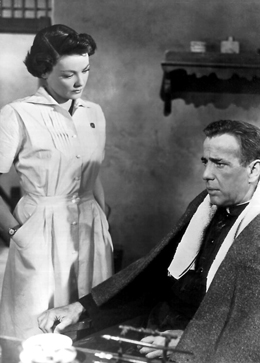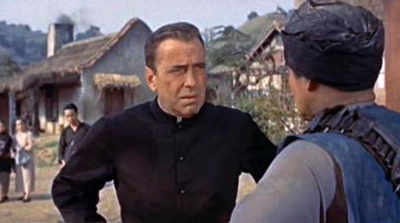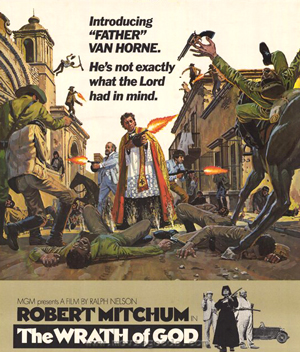
 |
|
|
|
Hollywood's relationship with miracles, God and the Church has always been a peculiar one. Complaints about Hollywood's licentiousness led C.B. DeMille to invent a thoroughly hypocritical method of combining the Bible and salacious material into his religious epics. When the Production Code came in priests and ministers were more likely to be treated with the proper respect, but the demands of drama still set up odd moral situations for men in clerical garb. Priests served as a kind of censorship counterweight in crime movies like the clever Angels with Dirty Faces, which used repentance as a third act green light for a lot of entertainingly anti-social delinquency in the film's first two-thirds. The charming Going My Way posited Bing Crosby as a priest who does good works in the community while leading orphan kids in happy sing-a-longs. A sequel to that film provided Ingrid Bergman with a dicey role indeed. With just a twinkle in their eyes and an assurance that their friendship is entirely spiritual, the film nevertheless flirted with the notion of a romance between Bergman and Crosby. It's part of the movie's appeal. The late '40s saw a general rise in the number of Hollywood movies about Catholic miracles, most in general good taste. A synopsis of The Left Hand of God, one of Humphrey Bogart's last films, sounds like a real minefield of questionable situations and attitudes. Author William E. Barrett also wrote the novel Lilies of the Field, which would serve as an interesting comparison. Both are inspirational stories about secular men that arrive at remote missions and "make a difference". The Left Hand of God appears to have been heavily shaped by experts, and a significant amount of screen time is spent bending some of unlikely characters into shapes acceptable to a Church view of morality. 
1947. Father O'Shea (Humphrey Bogart) is welcomed at a Chinese mission-clinic by doctor David Sigman (E.G. Marshall), his wife Beryl (Agnes Moorehead) and the attractive nurse Anne "Scotty" Scott (Gene Tierney). Having lost his vestments, etc, in a river accident, O'Shea doesn't hold mass but instead proves himself a kindly and thoughtful spiritual advisor to the small peasant community, helping with the sick and grief-stricken. David and Beryl begin to wonder about their new priest. O'Shea has more knowledge of the local warlord Mieh Yang (Lee J. Cobb) than expected, and he even strikes down one of the sinister Yang's messengers. And Beryl senses something altogether too secular about O'Shea's relationship with Scotty: the nurse unconsciously makes herself more attractive for him. Warned by David, Father O'Shea seeks advice from a neighboring Protestant minister (Robert Burton) ... and makes a surprising confession. The moment we see Humphrey Bogart leading a mule through hostile Chinese territory (Fox's Malibu Ranch) we know something's up: he's carrying an automatic pistol. From that moment on The Left Hand of God is a known quantity, and the explanatory flashback that occurs in the fifth or sixth reel comes as no surprise. Bogie's character is only pretending to be a priest, and may be a criminal. 1 The rest of the movie is an entirely civilized drama that raises hints of forbidden romance and notions of a violent priest, only to deliver a slightly tougher variation on a Bing Crosby movie. Bogart even sings "My Old Kentucky Home" with the adorable Chinese orphans, playing the piano while the delighted Gene Tierney looks on. The great Agnes Moorehead delivers some choice lines about females, saying that they are all prisoners of physical urges. All evidence aside, it's not very flattering to Nurse Scotty's intelligence. Lee J.Cobb's grotesque makeup is certainly arresting, what with a set of immobile eyelid extensions that make him look as if he's wearing bagel slices over his eyes. His Mieh Yang is the most courteous and upstanding Warlord one could imagine. Why, the man is so reasonable and principled that he doesn't seem the type to burn villages and slaughter peasants. The actor's speeches are more like outbursts; he never really seems threatening. 
The parameters of acceptable scripting don't allow Bogart's Father O'Shea character much in the way of elbow room. One needs to recall that censorship of movies in the 1950s was a 'community standards' issue, the same general wave of conservatism that considered any criticism of the Church to be anti-American. The conservative wave had already condemned Ingrid Bergman for her private life, vilifying her as morally unsound. I'm not sure to what degree Barrett's original book was critical of the status quo, if at all. The finished The Left Hand of God doesn't really give Bogart's character a chance to cause trouble. From the moment Father O'Shea enters the mission he is already equal to the humanistic demands of a priest's day-to-day lay activities. He's compassionate, self-possessed and charismatic, a natural leader. He's like that from the get-go, without even an adjustment period. Maybe he missed his calling. Bogart and Gene Tierney are quite good in roles that don't allow them the romantic encounter fans would expect. The "moral" ending is fairly frustrating. Without deeper insights into their motivations, something seems compromised, as if the censors ruled out allowing its cassock-wearing hero to have a true love finale. 2 Bogart is clearly modulating his performance. He looks slightly troubled and conflicted and rarely varies his ambiguous poker face. E.G. Marshall's had been in films for ten years and his was just getting serious traction. It's possible that Bogie liked Marshall in his previous The Caine Mutiny and promoted him for the role. Agnes Moorehead is terrific as usual, and pitches her character's suspicions of hanky-panky in the mission at the perfect level. She's neither a gossip nor a prude, but a China social worker with a practical mind. We're told that this was a dark year for Gene Tierney, whose personal and professional life was broken with bouts of mental illness. Insert essayist Julie Kirgo says that Bogart helped coach her through her role, and Tierney's reported difficulties are not evident on screen. She does keep her hands in her pockets a lot � Tierney's problems did not go away. This would be her last film for five full years. The Left Hand of God gives some good roles to seasoned Asian actors (Victor Sen Yung, Philip Ahn, Benson Fong) and offers plenty of bits and extra work. Edward Dmytryk's direction is more or less invisible, the kind of 'just plant the camera' coverage that led critics to decry CinemaScope as antithetical to expressive filmic composition. One standout angle for the wide, wide screen shows Bogart framed between the splayed legs of a Chinese bandit ... that almost looks like a parody of a later Sergio Leone visual. It's meaningless. Twilight Time's DVD of The Left Hand of God is a beauty; I remember trying to watch this title in miserable pan-scanned TV prints back in the 1970s, and giving up. The flawless enhanced widescreen transfer has excellent color. 1955 must have been a wet year in Southern California for the Fox Ranch in Malibu never looked greener. Sets for this show turned up in dozens of later films, including The Hunters, which I just watched recently. Composer Victor Young's very effective music contains a stealth love or "faith" theme. Twilight Time's Isolated Music Score allows it to be audited separately. I imagine that these isolated scores are generating more viewer interest in collecting classic film music. Julie Kirgo's liner notes stress the career of producer Buddy Adler. She points out that five of Adler's Fox films are set in China or the Orient -- The Revolt of Mamie Stover, Soldier of Fortune, House of Bamboo, Love is a Many Splendored Thing and his last Inn of the Sixth Happiness. None pay particular attention to politics, but The Left Hand of God does hint that the mission system may not last long, without mentioning the impending Communist victory. 
All things considered, The Left Hand of God is a gem of reason and good taste when compared to Leo McCarey's hysterical Satan Never Sleeps (1962), a "priests vs. Commies" potboiler starring William Holden and Clifton Webb. An opposite kind of outrage can be seen in 1972's incredibly trashy The Wrath of God, an ersatz spaghetti western that makes its vicious bandit-hero (Robert Mitchum) masquerade as a priest.
On a scale of Excellent, Good, Fair, and Poor,  Footnotes:
1. Spoiler galore: Bogart's fake priest O'Shea is really Jim Carmody, an Air Corps China flyer who crashed and was taken prisoner by Lee J. Cobb's warlord. Carmody has been forced to serve as a mercenary for Cobb for three years (!) and has carried on a friendly, if nervous, relationship with the brigand. This Terry & the Pirates idea seems unlikely unless we accept that Carmody speaks fluent Chinese and had some magical leadership ability that Cobb's own lieutenants don't -- all of Cobb's men seem to be moronic thugs. What's more strange is that the warlord Cobb would seem to have migrated a thousand miles or so. The "hump" flyers barely had enough fuel to get into Southern China, and Cobb's fiefdom appears to be up North somewhere. Also, this particular warlord's activities are decidedly apolitical -- by 1947 one would think that he'd have been co-opted by the Nationalists or the Communists. If this thinking is all wrong, please correct me! 2. The conclusion prompts another major spoiler: Poor Scotty (Gene Tierney) is totally confused, then not confused at all. She didn't realize that she was going soft on Father O'Shea until the last moment, but now that it is proven that he is not a man of the cloth, the attraction is over. The visiting priest insists that the forbidden flirtation (it wasn't even that) must be forgotten forever, and Scotty and Jim Carmody both seem to agree. In my mind, if Scotty was attracted to Carmody only when she thought he was a priest, the situation is odd, if not perverse.
But first and foremost, the church authorities are (I think) unreasonable about the entire incident. Jim Carmody is not a criminal, but a desperate downed Allied flyer escaping from hostile territory in the only way he can. The church in wartime has recorded plenty of incidents where innocent civilians were given sanctuary from the enemy -- there's even a Roberto Rossellini movie Era notte a Roma in which monks disguise fugitives as their own, and a starving woman dresses as a nun as a way of convincing farmers to sell her food. Frankly, Carmody is doing the missionaries a favor by keeping up appearances.
Reviews on the Savant main site have additional credits information and are often updated and annotated with reader input and graphics. Also, don't forget the 2011 Savant Wish List. T'was Ever Thus.
Review Staff | About DVD Talk | Newsletter Subscribe | Join DVD Talk Forum |
| ||||||||||||||||||